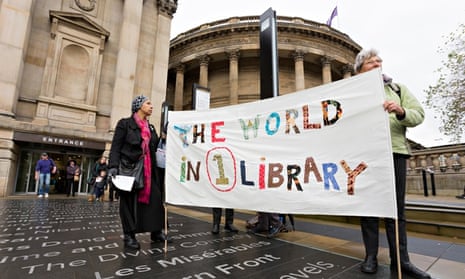Libraries are a “golden thread throughout our lives”, according to a new government-commissioned report, which slams “decision-makers” who do not “appear sufficiently aware of the remarkable and vital value that a good library service can offer”.
William Sieghart’s Independent Library Report for England, published today, urges “a reinvigoration of the library network”, calling on Westminster to provide funding so local authorities can roll out Wi-Fi to every public library in England as part of a new national digital resource. The provision of Wi-Fi, it says, is essential, with its lack of availability in some libraries creating “a barrier to the public using its facilities, especially amongst the younger generation”.
“By not providing Wi-Fi and high-quality computer facilities, libraries often present a negative image of being old fashioned places that have little relevance in today’s society,” says the report, which calls for the Wi-Fi to be delivered “in a comfortable, retail-standard environment, with the usual amenities of coffee, sofas and toilets”.
It continues: “Central government, by investing in digital resources across the library network, could show that it understands how crucial the service is to both the welfare and the advancement of the nation.”
Libraries minister Ed Vaizey responded by announcing that he had created a new task force to help develop the library service in England, as an “immediate first step” to implementing the report’s suggestions. There was no mention of extra funding in his statement.
Sieghart, who founded the Forward poetry prize, and his advisory panel, which includes novelist Joanna Trollope, Faber & Faber chief executive Stephen Page and literary agent Caroline Michel, took seven months to write the report, visiting urban and rural library branches, discussing the issues with local government, and receiving more than 200 written submissions.
Two themes, Sieghart writes, have emerged. “The first was that there have already been far too many library reviews in recent years which have come to nothing. The second was that not enough decision-makers at national or local level appear sufficiently aware of the remarkable and vital value that a good library service can offer modern communities of every size and character.”
The panel believes “that the future of libraries as community hubs is essential for the wellbeing of the nation,” Sieghart writes, adding that England’s public library service is at a crossroads. A report from the Chartered Institute of Public Finance and Accountancy released last week found that 49 library branches in the UK have closed in the past 12 months, leaving 4,145 remaining.
“Libraries are, let us not forget, a golden thread throughout our lives,” writes Sieghart. “The library does more than simply loan books. It underpins every community. It is not just a place for self-improvement, but the supplier of an infrastructure for life and learning, from babies to old age, offering support, help [and] education, and encouraging a love of reading.”
Other recommendations in the report include the establishment of a taskforce led by local government to provide a strategic framework for England, and to improve and revitalise local library services. A national library card is also mooted, as is sharing of digital networks.
“A national strategy could articulate what libraries are, and why they are a force for good for us all,” believes Sieghart. “Libraries belong, after all, to every one of us.”
In his statement welcoming the report, Vaizey said: “We welcome the panel’s recommendations, which are being considered in detail. I am taking the immediate first step in partnership with local government to set up the joint task force to advise on implementation of the recommendations.”
He added: “I whole-heartedly support the public library service which has been making a vital contribution to the knowledge, delight and quality of life of communities in every part of England for more than 150 years. They are a cherished part of our cultural heritage, and a key player in our future.”
Library campaigner Desmond Clarke hailed the report as “a blueprint for national and local government and the profession to build a user-friendly service in a world of both digital and print”.
“Government must commit to making the required investment in technology, local government must look hard at the need for 149 separately managed authorities, and we must all ensure that this report is not kicked into the long grass but gets cross-party support,” he said.
The Society of Chief Librarians president Ciara Eastell said that “universal free Wi-Fi coverage would enable all libraries to play a crucial role at the heart of local communities”, and added that the organisation “would have welcomed a commitment to investment in public libraries to support the report”.
Laura Swaffield, chair of charity the Library Campaign, praised the report’s “insight that library services – despite heavy cuts and official ignorance – are still widely used, and often offer innovative, impressive services”, but said that “all this is rapidly going down the drain”.
“On this government’s watch, over 900 libraries have already closed or been dumped on to reluctant volunteers to run as best they can – or are currently threatened with this fate. Countless others stay ‘open’, but are cutting staff, stock and opening hours,” she said. “Sieghart has a good list of what needs doing. Some of it will cost a little money. Now we want action.”
Tim Coates, Fellow library campaigner and former Waterstones managing director was more damning: “The reason why people aren’t using libraries is that when they go there, there is nothing remotely interesting to read ... end of story,” he said. “It’s not about digital technologies - it’s not about cups of coffee - it’s not about changing copyright laws so that authors become even more deprived than they are now - it’s not about anything except more books in libraries. So we have another report which does the two things everybody said not to do - don’t write a waffly report about golden threads and don’t ask for money.”

Comments (…)
Sign in or create your Guardian account to join the discussion